
“The doctor of the future will give no medicine, but will interest his patients in the care of the human frame, in diet, and in the cause and prevention of disease." - Hippocrates, the Father of Medicine.
That's kind of what Hippocrates, the super-smart doctor from way back, had in mind. Well, technology is catching up to his vision, and a new tool called generative AI technology in healthcare is making it a reality!
Generative AI in the Healthcare industry is like a powerful AI system that can analyze vast amounts of healthcare data, including medical journals, patient records, and even genetic information.
Generative AI has already permeated various industries, slashing inventory costs and driving cost-effective solutions. In healthcare, it wasn't just a possibility, it was a necessity waiting to happen.
The global generative AI in healthcare market size was valued at a staggering USD 1.8 billion in 2023 and is expected to explode to USD 22.1 billion by the end of 2032, reflecting a whopping Compound Annual Growth Rate (CAGR) of 32.6% over the analysis period.
This explosive growth highlights the immense potential of generative AI to revolutionize healthcare delivery, improve patient outcomes, and empower individuals to take charge of their well-being.
But wait!
How exactly is generative AI making waves in healthcare? You might be wondering, "What is generative AI in healthcare, anyway?”
So let’s get a basic understanding of what the fuss is all about.
- What Is Generative AI in Healthcare?
- Applications of Generative AI in Healthcare Industry
- Implementing Generative AI in Healthcare Businesses
- Benefits of Generative AI in Healthcare
- What Is the Future of Generative AI in the Healthcare Industry?
- Challenges and Considerations of Generative AI in Healthcare
What Is Generative AI in Healthcare?
What if, we saying that AI doesn't just analyze your health data but uses it to create new possibilities for your well-being?
That’s how Generative AI for healthcare works.
It’s a cutting-edge technology poised to revolutionize the way we diagnose, treat, and prevent diseases. It scrutinizes vast information like medical research papers, patient records, and genetic data.
But unlike traditional AI, it doesn't just crunch numbers. It analyzes these patterns and relationships to generate entirely new things in the healthcare field, like:
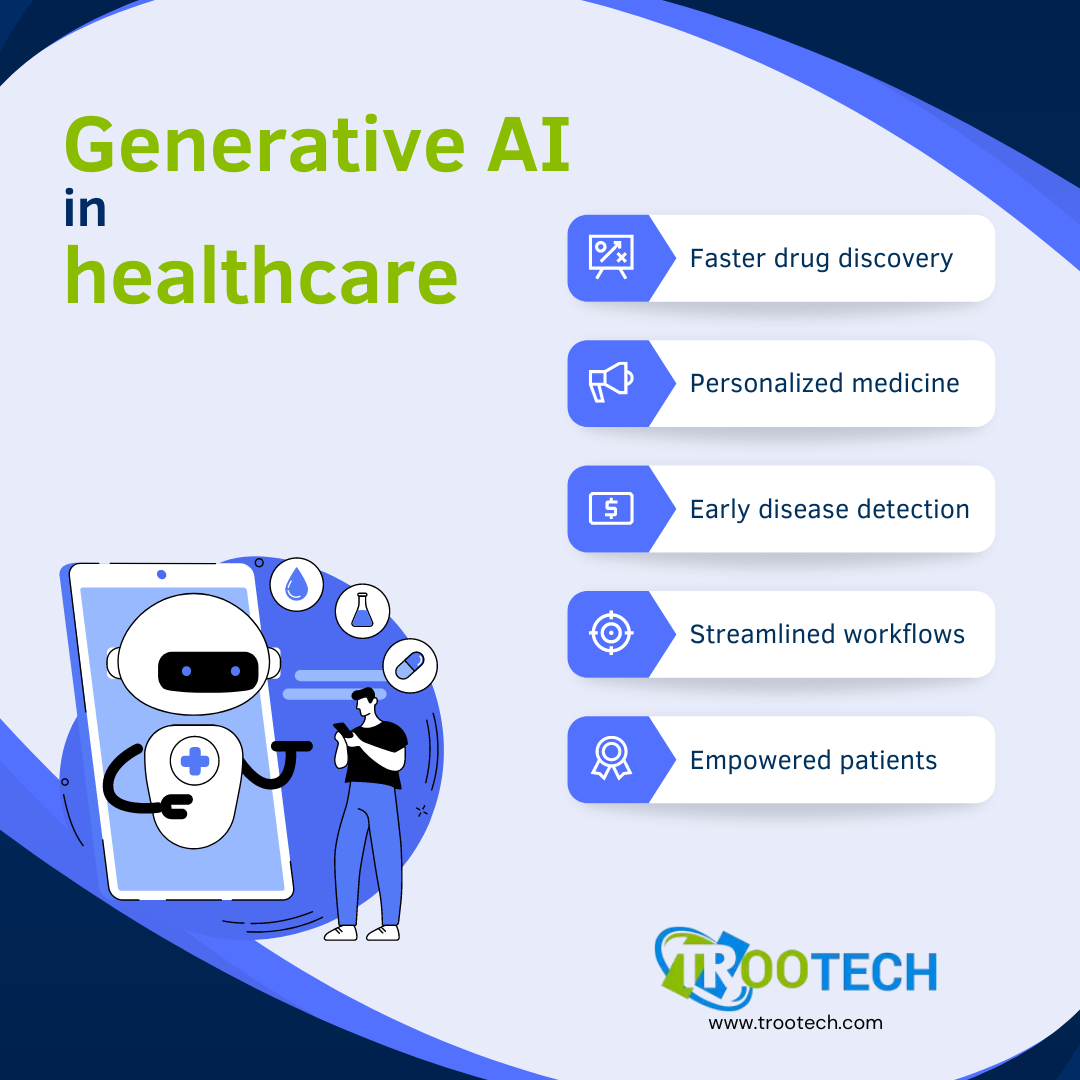
- Personalized treatment plans:
Generative AI can analyze your unique health data to create a customized roadmap to optimal health. Think of it as a personalized GPS for your body, suggesting the most effective treatments and preventative measures based on your individual needs.
- Faster drug discovery:
Generative AI for healthcare acts as a time machine, simulating millions of potential drug molecules in a fraction of the time it takes traditional methods.
- Improved diagnostics:
Generative AI can analyze medical scans, like X-rays and MRIs, with incredible accuracy, acting as a doctor's second pair of eyes. This allows for earlier and more accurate diagnoses, leading to better patient outcomes.
These are just a few examples of how generative AI for healthcare is making its mark.
It's not just about treating illness; it's about empowering patients and focusing on preventative care. This aligns perfectly with the vision of Hippocrates, the Father of Medicine, who emphasized the importance of "the care of the human frame."
Now you might be wondering, "Where exactly are we seeing AI applications for healthcare like generative AI being used?"
Well, scroll down, because in the next section, we have explored the real-world applications of generative AI in hospitals, clinics, and beyond!
Where exactly are we seeing AI applications for healthcare like generative AI being used?
The answer is very simple, Right in your doctor's office, and beyond! Gen AI in healthcare is no longer science fiction.
For a quick snapshot of how generative AI is revolutionizing healthcare, check out this infographic!
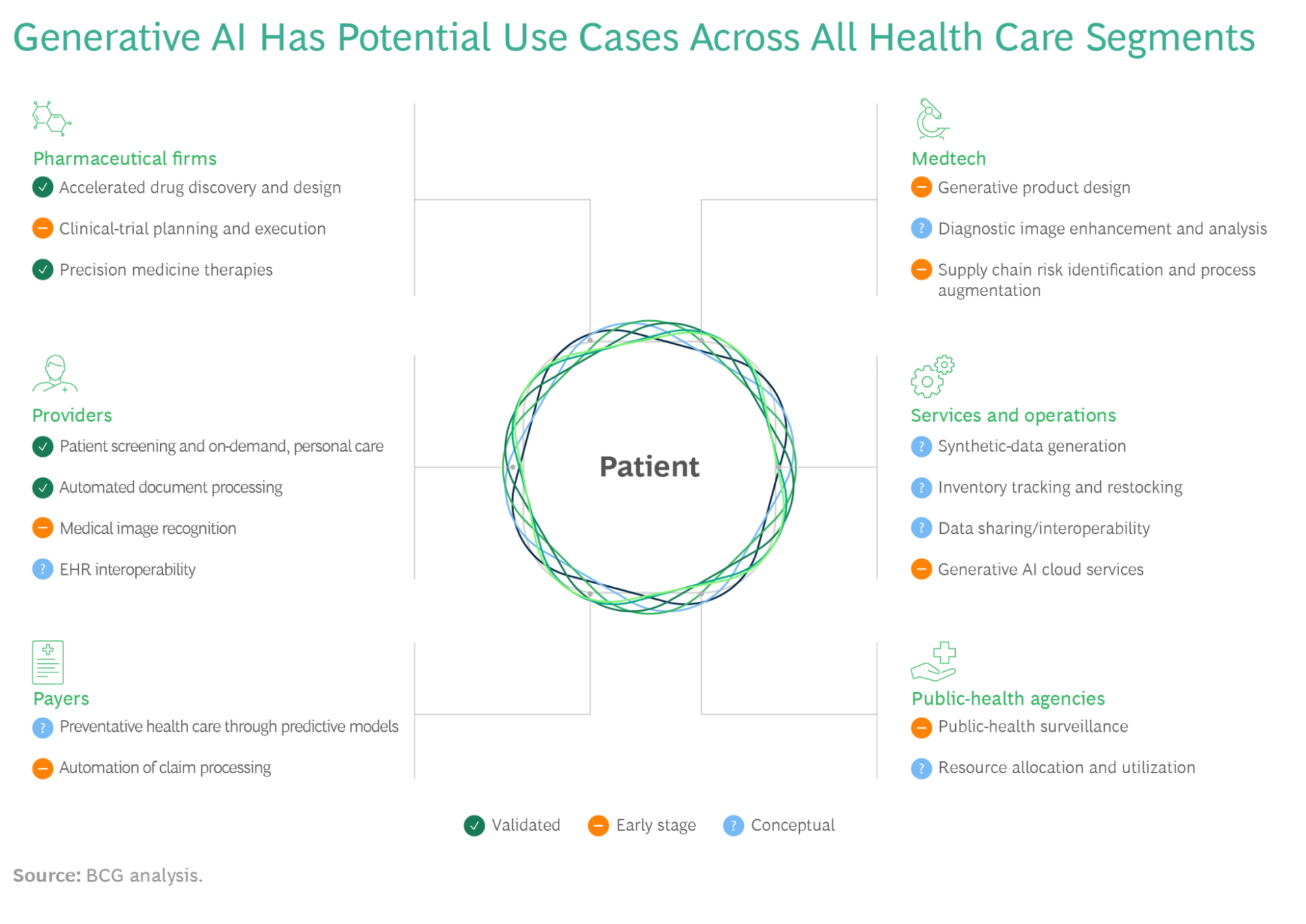
These are just a few ways generative AI is making a real difference in healthcare!
As the technology continues to evolve, we can expect even more groundbreaking applications to emerge. The future of healthcare is brimming with possibilities, and generative AI is poised to be a key player in transforming how we approach health and well-being for generations to come.
Applications of Generative AI in Healthcare Industry
Did you know that the global market for gen AI in healthcare is expected to reach a staggering USD 22.1 billion by 2032?
This explosive growth reflects the multitude of applications this technology offers. Generative AI isn't just about analyzing data; it can create entirely new possibilities, transforming the way we diagnose, treat, and prevent diseases.
To gain some more knowledge let's further understand how AI in healthcare applications is making waves.
1. Medical Imaging:
In terms of medical imaging, generative AI acts as a transformative assistant to radiologists. It transcends traditional analysis by leveraging its ability to "generate" insights:
Automating Image Analysis and Segmentation:
Radiologists spend significant time manually segmenting scans, a process ripe for automation. Generative AI algorithms, like convolutional neural networks (CNNs), excel at this task.
By analyzing vast amounts of labeled data, CNNs can learn to differentiate tissues and organs with remarkable accuracy. This not only frees up radiologists' time for complex cases and patient interaction but also fosters consistency and reduces human error in segmentation.
Enhanced Diagnostic Accuracy:
Generative AI goes beyond segmentation by acting as a vigilant partner in diagnosis. Trained on extensive datasets of medical images with confirmed diagnoses, generative AI can identify subtle patterns indicative of early-stage diseases.
These patterns might be missed by the human eye, leading to earlier intervention and improved patient outcomes.
For instance, generative AI algorithms can detect minute anomalies in mammograms, potentially leading to earlier detection of breast cancer.
Generating Synthetic Medical Data:
Training future doctors requires exposure to a diverse range of medical cases. However, real patient data comes with privacy concerns. Generative AI bridges this gap by creating synthetic medical images that mimic real data with remarkable accuracy.
This allows medical students to practice in a wider variety of scenarios while safeguarding patient privacy.
Additionally, generative AI can be used to generate synthetic data with specific pathologies, addressing the challenge of limited real-world data for certain rare diseases.
2. Drug Discovery and Development:
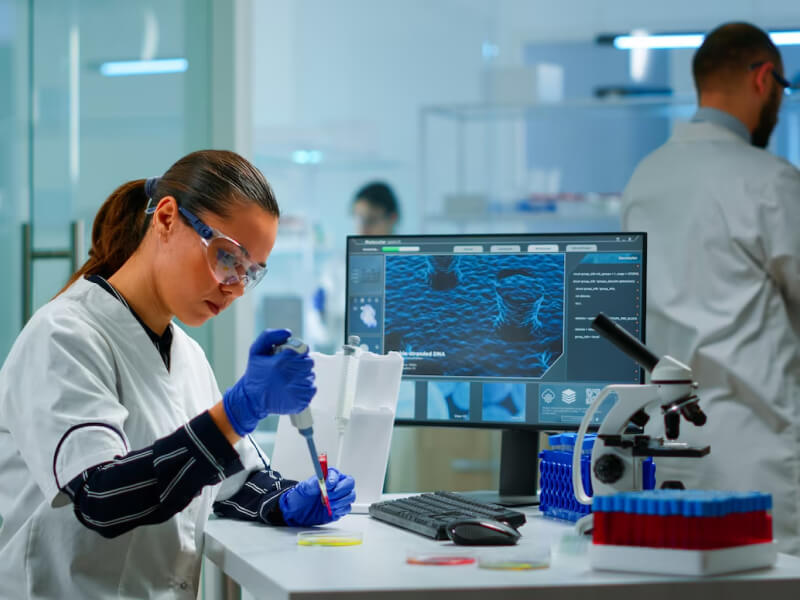
The traditional drug discovery process is a time-consuming and resource-intensive endeavor.
Generative AI is revolutionizing this field by introducing a new paradigm:
Generating New Drug Candidates:
Generative AI algorithms, like Generative Adversarial Networks (GANs), can simulate countless variations of drug structures. These algorithms essentially "learn" from existing successful drugs and generate entirely new molecules with desired properties, acting as a virtual laboratory for drug discovery.
This significantly accelerates the initial phase of drug development, potentially leading to breakthroughs in areas with unmet medical needs.
Predicting Drug Interactions and Optimizing Treatment:
Generative AI can analyze a patient's unique genetic makeup to predict how they might react to a specific drug. This involves analyzing a patient's genome and identifying potential Single Nucleotide Polymorphisms (SNPs) that might affect drug metabolism or efficacy.
By predicting potential interactions, generative AI empowers doctors to personalize treatment plans, minimizing side effects and maximizing treatment success.
Streamlining Clinical Trials:
Generative AI can optimize clinical trial design by simulating patient responses to potential drugs. This allows researchers to identify the most promising candidates for further evaluation, leading to more efficient and cost-effective clinical trials.
Additionally, generative AI can be used to analyze vast amounts of clinical trial data, uncovering hidden patterns and accelerating the development process.
Furthermore, Generative AI in healthcare also helps hospitals and doctors to:
3. Deliver Personalized Medicine:
Personalized medications can be offered by deeply analyzing patient data (genomics, medical history) to predict disease risk and progression. This enables proactive measures and early intervention.
By analyzing a patient's unique characteristics, GenAI can suggest the most effective drugs and dosages, optimizing pharmacogenomics.
4. Assists and helps in Medical Research and Data Analysis:
Automating data processing tasks like medical record summarization and data cleaning. Identifying patterns and trends in vast datasets, potentially leading to groundbreaking discoveries.
Generating synthetic patient data to address privacy concerns and enable researchers to simulate clinical trials and test new hypotheses more efficiently.
5. Administrative Tasks:
Doctors are bogged down by administrative tasks like scheduling, paperwork, and billing.
These tasks can steal hours each week, leaving less time for what truly matters: practicing medicine and seeing patients.
This burden can lead to burnout and hinder the quality of care.
GenAI applications help them to automate mundane tasks by:
- Automating appointment scheduling and reminders to reduce administrative burden and improve patient experience.
- Generating reports and summaries from medical notes and imaging data, saving doctors time and reducing errors.
- Assisting with medical coding and billing for accurate claims processing and faster reimbursements.
6. Pandemic Preparedness:
The recent COVID-19 pandemic highlighted the critical need for early disease detection and rapid response strategies.
GenerAI can be a powerful tool in this fight.
For instance, AI models are being developed to analyze social media trends and news reports to detect outbreaks in real-time, similar to how some systems identified early signs of COVID-19 spread.
Additionally, GenAI can be used to simulate future pandemics with different characteristics, allowing healthcare officials to test and refine response plans before a crisis hits.
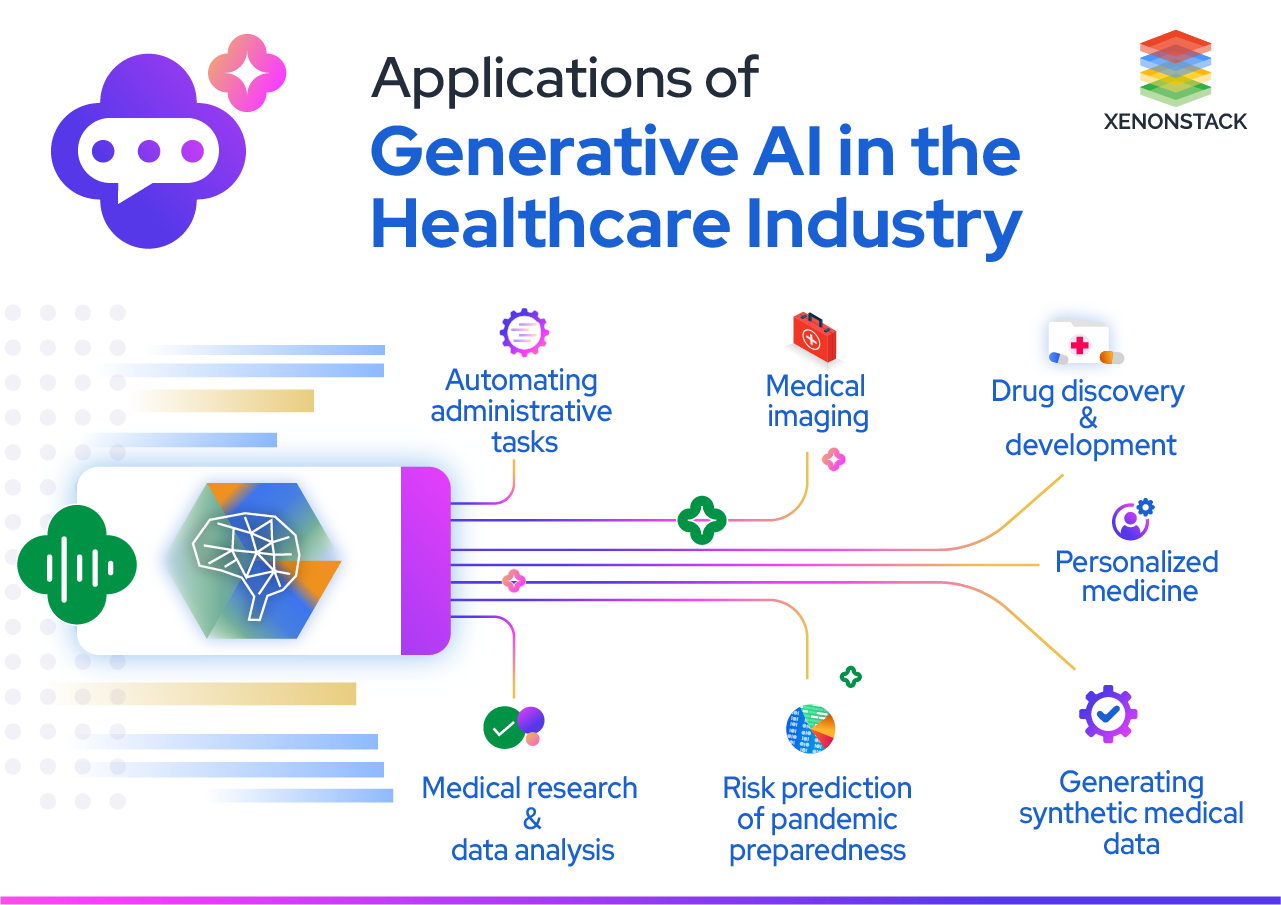
These are just a few examples of how GenAI is transforming pandemic preparedness and equipping us to better handle future public health emergencies.
By streamlining workflows, boosting research, and personalizing care, GenAI has the potential to revolutionize healthcare and AI in healthcare applications.
But hold on to your stethoscopes, because the question remains: how do we actually make this happen?
Let's explore the practical steps to understand how GenAI will impact business, turning this powerful potential into a reality for your patients and staff.
Implementing Generative AI in Healthcare Businesses
We've seen how GenAI can revolutionize everything from personalized medicine to pandemic preparedness, but how do healthcare businesses translate this sci-fi dream into reality?
The possibilities are truly mind-boggling, but with great power comes great responsibility (cue Spiderman theme song, but silently in your head).
So, here are some of the tried and tested and 100% effective implementation strategies that you can apply for implementing generative AI in the healthcare business:
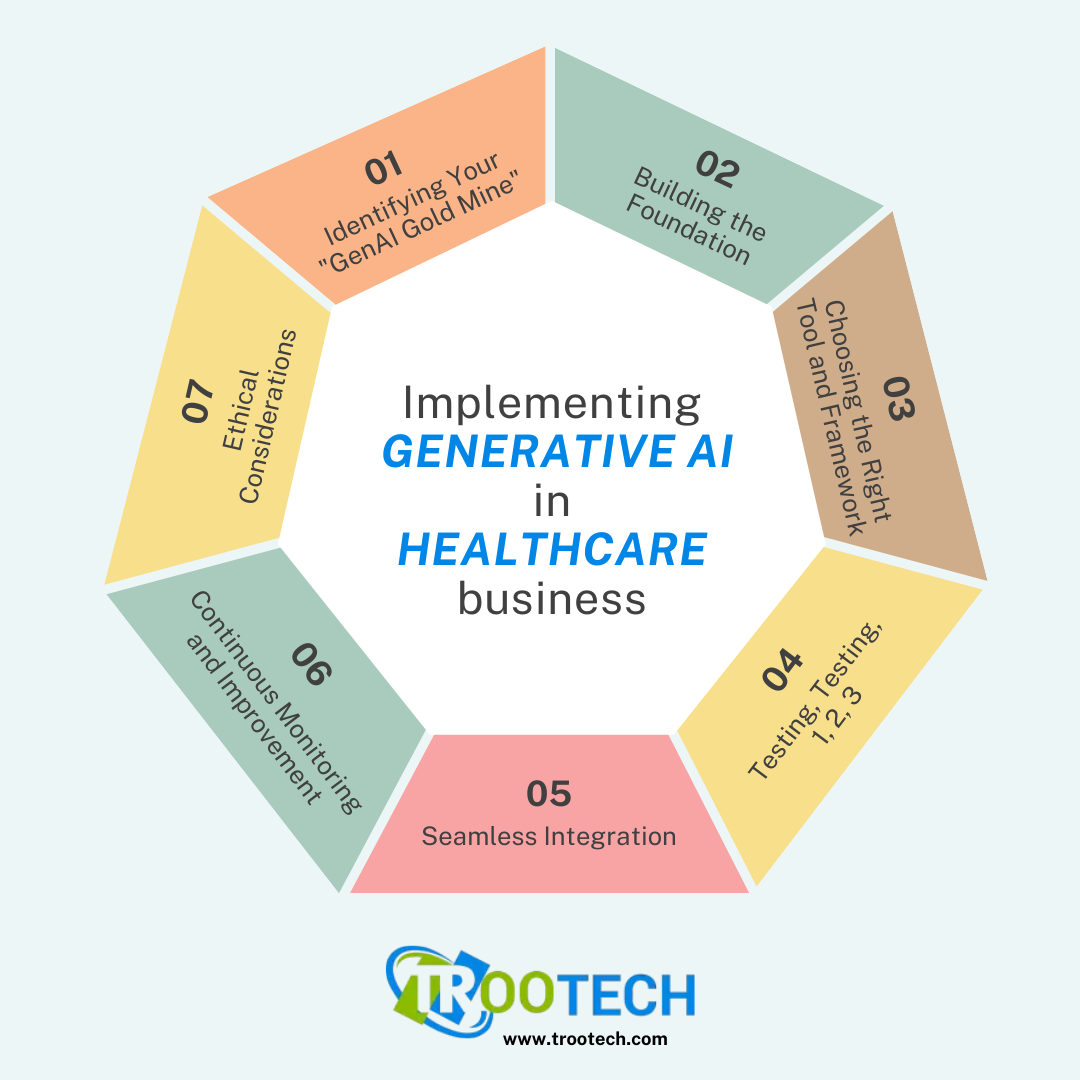
1. Identifying Your "GenAI Gold Mine"
The first step is a collaborative brainstorming session. You need to identify the bottlenecks and areas where GenAI can offer the most significant impact.
Here are some examples to spark your imagination:
- Medical Imaging Analysis
- Personalized Medicine
- Administrative Workhorse
Beyond these too, explore the unique needs of your healthcare business and identify the AI applications in healthcare that provide the most value.
2. Building the Foundation
Data is King
As the saying goes, "garbage in, garbage out." That's where you need to start the process of collecting high-quality data that's diverse, relevant to your chosen use case, and fully compliant with HIPAA regulations.
While the healthcare sector demands the utmost secrecy, you need to make sure that you follow data security protocols and ensure your models are trained on ethically sourced and anonymized information.
Remember, the quality of your data directly impacts the effectiveness of your GenAI solution.
3. Choosing the Right Tool and Framework
Model Selection and Training
The world of GenAI models is vast. Don’t get bombarded with technical jargon, but focus on selecting the most appropriate generative AI architectures based on your specific needs.
For instance, if you're focusing on medical image analysis, Generative Adversarial Networks (GANs) might be a powerful choice.
Through a meticulous process of fine-tuning, ensure your models achieve optimal performance within the complexities of the healthcare industry. This involves tailoring the model's parameters and training it on your specific data to achieve the desired level of accuracy and reliability.
4. Testing, Testing, 1, 2, 3
Validation is Crucial
Before putting it all out, put the model through rigorous testing using separate datasets. This validation process ensures the accuracy and reliability of your models, meeting the high standards expected in AI healthcare.
Imagine it as a pilot run – it would help to identify any potential biases or errors and refine the model until it delivers consistent and reliable results.
5. Seamless Integration
Integration is key!
GenAI solution has the power to seamlessly integrate with your existing healthcare systems like Electronic Health Records (EHR) and billing software. Implementing this would minimize disruption to your daily operations and allow your staff to leverage the power of GenAI without a steep learning curve.
Of course, throughout this process, maintain strict adherence to regulatory requirements like HIPAA and ensure smooth data flow within your existing infrastructure.
6. Continuous Monitoring and Improvement
The world of healthcare is constantly evolving, and your GenAI solution needs to keep pace. Don’t be settled loose with a static model.
Instead, implement mechanisms for ongoing monitoring and refinement. This ensures your GenAI stays sharp and continues to deliver optimal results over time.
Here's how you can achieve this:
- Performance Tracking: Establish key performance indicators (KPIs) tailored to your specific use case. This allows continuous monitoring of the accuracy, efficiency, and overall effectiveness of your GenAI model.
- Data Feedback Loop: Real-world data is a goldmine for improvement. Design a feedback loop that incorporates new data into the model, allowing it to learn and adapt to changing patterns and trends within your healthcare system.
- Staying Ahead of the Curve: The field of AI is constantly innovating. Always keep informed about the latest advancements in generative AI and explore their potential to further optimize your model's performance.
7. Ethical Considerations
At the core of everything you do lies a commitment to responsible AI development.
Here's how you can ensure your GenAI solution operates within the highest ethical frameworks:
- Transparency by Design
- Mitigating Bias
- Data Privacy
By following this comprehensive roadmap, you'll be well-equipped to implement GenAI and take advantage of its transformative potential in your healthcare business.
Remember, TRooTech is here to guide you every step of the way. Our team of experts can assist with everything from hiring AI developers with specialized knowledge in healthcare software development to simplifying the legalities of AI implementation.
Harness GenAI to Revolutionize Healthcare Operations
Embrace GenAI and Stay Ahead in Patient Care and Efficiency
Benefits of Generative AI in Healthcare
Let's get you those benefits in a way that'll make you smile wider than a patient with a clean bill of health!
From appointment scheduling, and health monitoring to analysis of vast amounts of patient data, this new technology offers advantages for both patients and healthcare providers.
1. Automating Repetitive Tasks
Let's face it, administrative tasks in healthcare can be a real drag – mountains of paperwork, endless phone calls, and repetitive data entry.
But hold on to your lab coats, because Generative AI is here to be your smart assistant!
This smart Gerenrative AI assistant takes care of appointment scheduling, report generation, and even medical coding. That's a huge chunk of time freed up for doctors, nurses, and other healthcare heroes to focus on what they do best – caring for patients!
Plus, a 2023 Accenture report highlighted how GenAI can automate up to 80% of repetitive tasks, leading to a smoother workflow and happier staff.
To read the detailed study click here.
Now that's something to celebrate!
2. Reducing Errors and Biases
We all know humans aren't perfect, and sometimes even the best doctors can make mistakes. But what if there was a way to minimize those errors and ensure fair treatment for everyone?
GenAI helps to minimize errors by analyzing vast amounts of data, that identifies patterns and potential biases in diagnoses and treatment decisions.
This means catching errors early on and ensuring all patients receive the best possible care, regardless of background.
A recent 2024 study published in Nature Medicine showcased how GenAI algorithms can outperform traditional methods in identifying subtle abnormalities in medical scans, leading to more accurate diagnoses and better patient outcomes.
3. Improving Predictions and Diagnoses
Remember that fortune teller at the county fair who always seemed to be a little off?
Well, forget the crystal ball because GenAI has brought real predictive power to healthcare!
By analyzing a patient's medical history, genetics, and lifestyle data, GenAI can create personalized risk assessments and predict potential health issues. This allows doctors to intervene early on, preventing complications and improving overall patient outcomes.
A recent article by the Times Of India explained how GenAI models can predict the risk of heart failure with incredible accuracy, allowing doctors to take preventative measures and potentially save lives.
That's some serious future-proofing for your patients' health!
4. Facilitating Training and Education
Remember those long nights cramming over medical textbooks?
Well, GenAI is about to transform how healthcare professionals learn!
By creating realistic simulations and providing access to a vast library of anonymized case studies, GenAI can personalize learning experiences for doctors, nurses, and other healthcare professionals.
This not only enhances their skills but also ensures they're prepared for anything that walks through the door.
A recent 2024 article in the International Journal of Medical Education highlighted how AI-powered simulations are significantly improving student engagement and retention of complex medical concepts.
So, ditch the textbooks and get ready to learn with the power of GenAI!
5. Driving Innovation and Breakthroughs
The world of healthcare is constantly evolving, and GenAI is acting like a jetpack strapped to its back!
By analyzing massive datasets and identifying hidden patterns, GenAI can lead to groundbreaking discoveries in disease prevention, treatment optimization, and drug development.
For example, a 2024 research paper showcased how GenAI algorithms are helping researchers design personalized cancer treatments based on a patient's unique genetic makeup.
This is just the tip of the iceberg, folks!
GenAI is poised to revolutionize healthcare research and usher in a new era of medical breakthroughs!
Transform Healthcare Business with Generative AI
Drive Efficiency and Elevate Patient Care with Our Expert Consultation
What Is the Future of Generative AI in the Healthcare Industry?
This tech is poised to be a Top Technology Trend in 2024, and for good reason. AI and ML development services will be booming as companies race to integrate GenAI into their healthcare businesses.
Unlike traditional AI which focuses on analyzing existing data, GenAI takes things a step further. It can actually generate new data, like realistic medical images, synthetic patient data sets, or even personalized treatment plans.
The possibilities with GenAI in healthcare are truly endless. Artificial Intelligence Statistics already paint a promising picture – studies show GenAI can significantly improve patient care, reduce costs, and personalize treatment plans.
Challenges and Considerations of Generative AI in Healthcare
While the future of GenAI in healthcare is bright, there are challenges to address. These include ensuring data privacy and security, mitigating bias in AI algorithms, and ensuring ethical development and implementation.
However, these challenges can be overcome with careful planning and collaboration between healthcare professionals, AI developers, and policymakers.
GenAI is not here to replace doctors; it's here to empower them. By working hand-in-hand with this innovative technology, healthcare professionals can create a future of better care, improved outcomes, and a healthier world for everyone.
At TRooTech, we understand the transformative potential of GenAI in healthcare. We're not just talking theory – we're here to help you build it.
Hire AI Developers with the skills and experience to bring your GenAI-powered healthcare app to life.
FAQs
Understand Generative AI for health care as a super-powered AI assistant specifically designed for healthcare. GenAI goes beyond traditional AI by not just analyzing data, but also creating new, valuable information. Think of it as generating realistic medical images to aid diagnosis, suggesting personalized treatment plans based on individual patient data, or even developing new drugs through AI-driven simulations.
The applications of GenAI in healthcare are vast and constantly evolving. Here are a few exciting possibilities:
- Streamlining workflows: GenAI can automate repetitive tasks like appointment scheduling, report generation, and even medical coding, freeing up healthcare professionals' time for patient care.
- Enhanced diagnostics: By analyzing medical images and patient data, GenAI can assist doctors in identifying patterns and potential errors, leading to faster and more accurate diagnoses.
- Personalized medicine: GenAI can analyze a patient's unique genetic makeup and medical history to create individualized treatment plans and medication recommendations.
- Drug discovery and development: GenAI can accelerate the drug discovery process by simulating potential molecules and identifying the most promising candidates for further research.
The future of generative AI (GenAI) in healthcare is nothing short of transformative. These AI-powered assistants seamlessly integrate into workflows, automating tasks, generating personalized treatment plans, and even aiding in complex diagnoses.
Beyond efficiency, GenAI has the potential to explore entirely new avenues for medical breakthroughs. We can expect to see AI accelerating drug discovery, personalizing medicine to an unprecedented level, and even boosting our preparedness for future pandemics.
The future of healthcare is bright, and GenAI is poised to be the driving force behind this exciting revolution.
The benefits of AI in healthcare are multifaceted and impact both patients and healthcare providers:
- For patients: Improved access to care, faster diagnoses, personalized treatment plans, and potentially lower healthcare costs.
- For healthcare providers: Increased efficiency through automation, reduced errors, improved decision-making support, and more time to focus on patient care.
The cost of implementing AI in healthcare can vary depending on the specific application and the size and complexity of the healthcare organization. However, the cost is expected to decrease as AI becomes more mainstream.
Additionally, the potential benefits of AI, such as improved efficiency and reduced costs, can help offset the initial investment.
TRooTech is the best choice for developing an app and integrating AI into your healthcare system due to its extensive experience and proven track record in the healthcare industry.
We offer cutting-edge solutions tailored to meet the unique needs of healthcare providers, ensuring seamless integration of AI to enhance patient care, streamline operations, and improve overall efficiency.
Our expertise in both app development and AI integration makes them the ideal partner for advancing your healthcare technology.


